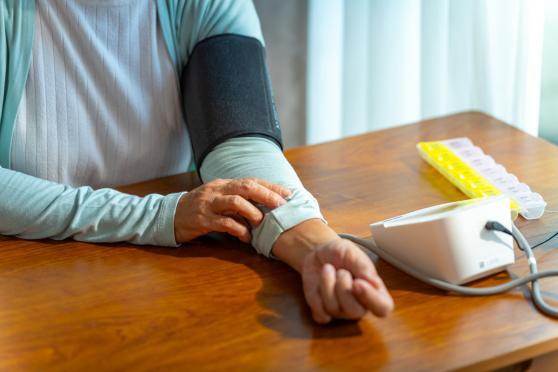Your top questions about cholesterol medication, answered
From statins to inhibitors, understanding how your cholesterol medication works can help bring your numbers down.

If you’ve been diagnosed with high cholesterol, your head might be spinning from all the new jargon: HDL, LDL, triglycerides. What’s good? What’s bad? And when is a higher number OK?
It’s a lot to take in — and that’s before statins and other cholesterol-lowering medications have been introduced into the conversation.
If your doctor has prescribed a medication to help bring your numbers down, it’s natural for you to have questions. Use this guide to understand how commonly prescribed cholesterol medications work, what to expect, plus lifestyle tips to help you successfully lower your cholesterol and keep it in a healthy range.
I feel fine. Do I need medication?
High cholesterol doesn’t produce any warning signs until the condition has reached an advanced stage, explains Maryland-based internist Ann M. Hester, M.D. For adults, a healthy total cholesterol number is between 125 and 200. Anything above 200 makes your doctor take notice.
Cholesterol medications aren’t typically the first line of defense against high cholesterol. Doctors often recommend making lifestyle changes, such as exercising more and tweaking your diet, to bring your levels down.
Before prescribing medication, they’ll also consider your family history. Your age, weight, and other health issues also play a role. Do you have diabetes? Have you already had a heart attack or stroke?
The answers to these and other health-related questions — combined with your test results —will guide your doctor’s treatment plan for you. Remember, the goal is to get your numbers down and reduce your risk of a heart attack or stroke.
Need help finding a heart health doctor? Click here to find a participating provider near you.
Why are you recommending this particular cholesterol medication?
When it comes to choosing the right medication, a lot depends on the breakdown of your total cholesterol numbers and your health history, says Dr. Hester.
The greatest concern is your “bad” LDL cholesterol numbers. Levels above 160 are considered dangerous.
Too much LDL in your blood can cause your arteries to clog. This makes it difficult for oxygen and nutrient-rich blood to get to your heart, which can lead to life-threatening conditions.
Most cholesterol medications target LDL numbers. Some target LDLs and HDLs, the “good” cholesterol. How these medications work can vary. Some get your liver to make less cholesterol. Other medications remove the cholesterol you have in your blood.
The most commonly prescribed cholesterol medications include:
Statins: These drugs slow down the liver’s production of cholesterol and increases the liver’s ability to remove cholesterol from the blood.
Bile acid sequestrants: These medications remove bile acids to help remove cholesterol from the blood.
Niacin: This is a B vitamin that lowers LDL cholesterol and total cholesterol levels, raises HDL levels, and reduces triglyceride levels.
Fibrates: These medications reduce LDL cholesterol and triglyceride levels, increasing HDL cholesterol.
Injectable medications: These drugs, which are called PCSK9 inhibitors, lower LDL cholesterol levels. They’re used primarily for people who are at an extremely high risk of heart disease who haven’t been able to lower their cholesterol in other ways.
Are there special instructions I need to follow?
Ask your doctor or pharmacist how to take your medication correctly, Dr. Hester says. For example, there are about seven different types of statins. The capsules or tablets are typically taken once per day, usually at night. Some need to be taken with food while others can be taken without.
Also, depending on which medication you’re prescribed, you may not be able to eat grapefruit or drink grapefruit juice, according to the U.S. Food and Drug Administration. That’s because this fruit doesn’t allow statin medications to break down, which can cause painful side effects. Your doctor or pharmacist will tell you if your particular statin cannot be taken with grapefruit or its juice.
If you’re prescribed an injectable PCSK9 inhibitor, you’ll need to have the shot every two to four weeks. The shot is given in the upper arm, stomach, or upper thigh. Your doctor will train you on how to give yourself the injection.
What side effects should I watch for?
All medications have side effects. Cholesterol medication is no different, says Dr. Hester. Common side effects to look out for include:
- Muscle pain or weakness
- Digestive issues
- Injection-site reactions with PCSK9 inhibitors
Statins come with some specific side effects, Dr. Hester adds. If you’re taking this type medication, be mindful of the following:
- Headache
- Nausea
- Diarrhea
- Constipation
- Joint pain
- Back pain
- Rash
To minimize side effects, carefully follow the dosing and other instructions, Dr. Hester says. And keep your doctor in the loop. If a side effect is particularly bothersome for you, your doctor may be able to adjust your dosage or even the medication type.
How will I know if they’re working?
Once your doctor starts you on a cholesterol-lowering medication, they’ll ask you to schedule regular follow-up visits and blood tests to see whether the drug is working as expected, according to the National Heart, Lung, and Blood Institute (NHLBI).
Typically, you may be asked to repeat your lipid panel (i.e., blood test) one to three months after starting a new cholesterol medicine, and every three to 12 months going forward.

Use Find a Doctor on hmsa.com to search for a participating provider near you today.
How long will I need to take my cholesterol medicine?
Most cholesterol medications are considered long-term medications, according to the NHLBI. They only work as long as you’re taking them. That’s why it’s important to take your medication exactly as your doctor or pharmacist tells you to.
If you’d like to stop taking any prescribed medication, it’s important that you talk to your doctor first. Remember, your doctor has prescribed this cholesterol-lowering medication to help prevent a heart attack or other life-threatening problem. It can be dangerous to stop taking it without the guidance of your doctor.
For the same reasons, if you have a hard time following the dosing schedule your doctor has prescribed — for example, if you often skip a dose or split pills — let your doctor know right away. They may be able to prescribe a different medication, adjust the dose, or suggest tips that will help you follow your treatment plan.
Will taking this medicine be enough to lower my risk of a heart attack or stroke?
Studies show that statins and other cholesterol-lowering medications can significantly reduce your risk of heart attack, stroke, and other cholesterol-related problems, according to the American Heart Association (AHA). But that doesn’t give you a free pass to ignore other heart-healthy habits, says Dr. Hester.
The AHA encourages those with high cholesterol to take the following actions to manage high cholesterol:
- Eat a heart-healthy diet. Load up on fruits, vegetables, and high-fiber foods; limit foods that are high in saturated fat and sodium.
- Move more. Physical activity helps increase good HDL cholesterol. Aim for 150 minutes of moderate-intensity exercise each week.
- Take steps to reach and maintain a healthy weight. If you’re overweight, the AHA says that losing 10% of your body weight dramatically reduces your risk of high cholesterol.
- Stop smoking. Quitting will help improve your cholesterol levels.
The bottom line
Managing your cholesterol levels is an important part of your overall health. High LDL cholesterol levels have been linked to increased risk of heart disease and stroke, among other issues.
Cholesterol medication may be a part of your treatment plan to lower your cholesterol levels and help prevent these adverse health events. Make sure you know how to take these medications and what symptoms to watch for. Always talk to your doctor about any concerns you have. Your health care team is there to support you and help you make the best decisions for your health.
Additional sources:
Cholesterol basics: MedlinePlus
Cholesterol testing: Centers for Disease Control and Prevention
High cholesterol levels: MedlinePlus
Cholesterol medications: MedlinePlus and Centers for Disease Control and Prevention
Statins: U.S. Food and Drug Administration
Cholesterol medication guidelines: U.S. Food and Drug Administration
Managing high cholesterol at home: National Heart, Lung, and Blood Institute and American Heart Association
H3832_8750_5MS621_24_C
© 2023, Linkwell Health, Inc. All content owned or licensed by Linkwell Health, Inc. All rights reserved.


